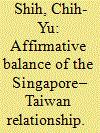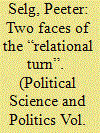| Srl | Item |
| 1 |
ID:
151250


|
|
|
|
|
| Summary/Abstract |
The relational turn of IR stresses the processual constitution of the state. The indigenous theory of Chinese IR adopts the relational turn but contends that the Chinese experiences are distinctive. Relying on the case of Singapore-Taiwan relationship, this paper argues that the Chinese relationality attests to a bilateral sensibility that does not confront the relational turn in general, which is multilateral. The case further contributes to the relational turn in showing non-security and affirmative components of relationality to the extent that the studies of the relational turn have remained embedded in the security concerns. The case applies the theory of “balance of relationship,” in which nations can practice self-restraint not in response to unilateral strategic calculus or multilateral rule making, but to bilateral reciprocity. The balance of relationship of the two proceeds at both the statist and the personal levels, introducing the affect of passion to the relational turn.
|
|
|
|
|
|
|
|
|
|
|
|
|
|
|
|
| 2 |
ID:
145072


|
|
|
|
|
| Summary/Abstract |
In the previous decade, the literature on “relational approach” has burgeoned in the social sciences. Recently, a “relational turn” in political science was called for in a symposium in this journal (McClurg and Young, 2011). The participants perceived a promising path for such a “turn” by introducing social network analysis (SNA) into political science. This call is informed by a conviction that the central concept of political science— that is, power—is relational. Considering this viewpoint, this article argues that there are two different understandings of the connection between the qualifier “relational” and the concept of power, referred to as the “Anglo-American” and the “Continental” perspectives. I contend that symposium participants conceived of the connection from only the Anglo-American perspective and that the Continental understanding would add extra value for political science.
|
|
|
|
|
|
|
|
|
|
|
|
|
|
|
|